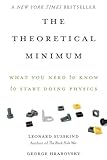The theoretical minimum : what you need to know to start doing physics / Leonard Susskind and George Hrabovsky.
By: Susskind, Leonard.
Contributor(s): Hrabovsky, George.
Material type: TextPublisher: New York : Basic Books, c2013Description: xi, 238 p. : ill. ; 22 cm.ISBN: 9780465075683 (pbk.).Subject(s): PhysicsDDC classification: 530
TextPublisher: New York : Basic Books, c2013Description: xi, 238 p. : ill. ; 22 cm.ISBN: 9780465075683 (pbk.).Subject(s): PhysicsDDC classification: 530 | Item type | Current location | Call number | Status | Date due | Barcode | Item holds |
|---|---|---|---|---|---|---|
| Book | Chennai Mathematical Institute General Stacks | 530 SUS (Browse shelf) | Available | 10228 |
Browsing Chennai Mathematical Institute Shelves , Shelving location: General Stacks Close shelf browser
Includes index.
The nature of classical physics -- Spaces, trigonometry, and vectors -- Motion -- Integral calculus -- Dynamics -- Partial differentiation -- Systems of more than one particle -- Energy -- The principle of least action -- Symmetries and conservation laws -- Hamiltonian mechanics and time-translation invariance -- The phase space fluid and the Gibbs-Liouville Theorem -- Poisson brackets, angular momentum, and symmetries -- Electric and magnetic forces -- Appendix 1. Central forces and planetary orbits.
A string theorist and a citizen scientist instruct lay readers on elementary principles of physics and associated math that amateur enthusiasts should know in order to study more advanced topics, in a reference that covers such topics as classical mechanics, electromagnetic fields and chaos theory-- Source other than Library of Congress.
"A first course in physics and associated math for the ardent amateur ... beginning with classical mechanics"--Dust jacket flap.







